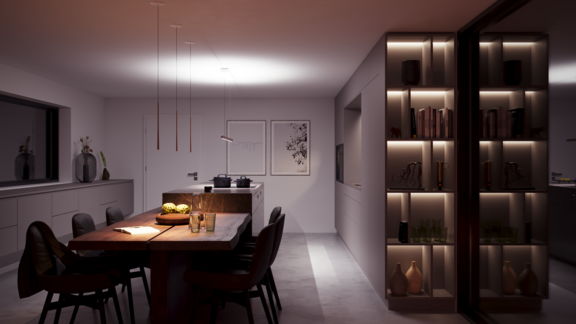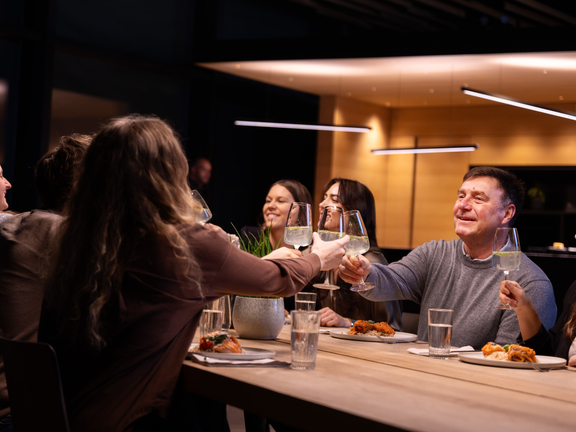

A romantic dinner for two, a cosy games evening with the family or an exuberant party with friends - the dining room is the place where life happens.
An intelligent lighting concept at the dining table is part of setting the right mood and creates a pleasant and appropriate atmosphere in a wide variety of situations. What does the perfect dining room lighting look like? You can find ideas and suggestions here.
It's not called that for nothing: Food is a feast for the eyes. Only when bathed in the right light can food become a perfect delight. One of the reasons for this is that we unconsciously associate colours with certain tastes and aromas. Strong red, for example, with the sweetness of tomatoes or the spiciness of chilli. The right light is therefore a must - and that means Light in a colour temperature of 2,700 to 3,000 K (Kelvin). It accentuates the colours of the food and creates a homely effect.

The second important function of dining room lighting is to create a pleasant ambience. Avoid glare or strong shadows at the dining table. In addition to these functional aspects, the emotional effect is an important factor. Above all, the brightness and the interplay of light sources control the atmosphere - from open and communicative to atmospheric and romantic. That's why it's a good idea to consider different scenarios when planning your dining room lighting.
A combination of two or more light sources is essential for balanced lighting. Natural light should also be included in the planning of the dining room.
Tip:
However, an additional light is not necessarily required to realise indirect lighting in the dining room. If you are still looking for an idea for dining table lighting, take a look at the BORA Horizon. Its innovative design combines the function of a pendant light and an indirect ceiling light.
If you have an idea for dining table lighting, it should match the dining situation and have the right effect. In this context, it is advisable to play through various scenarios.

Think, for example, of a dinner with family or a group of friends - there's laughing, eating and talking. For such an open and communicative atmosphere, bright light is recommended. To achieve this, bright ambient lighting is required, which the luminaire above the dining table actively supports with additional lamps or light sources.
Another typical scenario is an atmospheric dinner for two. In this case, the pendant luminaire takes on the main role, while the ambient lighting takes a back seat. The brightness of the dining table lighting can be adjusted as required using a dimmer. This functionality also comes in handy for a romantic candlelit dinner. Without discreet additional lighting, the candlelight often appears a little too gloomy.
So much for the basics of dining room lighting. Realising ideas for everyday use depends on the details: